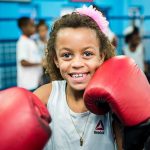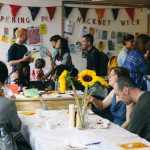Latin American Women’s Aid – empowering women to break free from violence
Each month, ELBA shines a spotlight on one of our community partners. Latin American Women’s Aid (LAWA) is a vital east London organisation that runs the only two refuges in Europe for Latin American women and children fleeing gender-based violence. They offer holistic and intersectional services, providing everything BME women need to recover and live empowered lives.
For this month’s community spotlight, we wanted to share the important work that they do and the challenges they face.
Tell us about Latin American Women’s Aid
 LAWA supports Latin American and other Spanish and Portuguese speaking (LASP) BME women and children who are experiencing gender violence to break free from abuse and improve their lives. It is our main goal to enable our beneficiaries’ social, economic and personal empowerment, promoting women’s independence and autonomy, as well as a non-violent environment where women and their children to thrive.
LAWA supports Latin American and other Spanish and Portuguese speaking (LASP) BME women and children who are experiencing gender violence to break free from abuse and improve their lives. It is our main goal to enable our beneficiaries’ social, economic and personal empowerment, promoting women’s independence and autonomy, as well as a non-violent environment where women and their children to thrive.
Since 1987 we’ve been running the only women’s refuges for Latin American women and children in the UK and Europe and an advice centre with various comprehensive services which address domestic violence, sexual abuse, trafficking and other harmful practices. Our culturally specific service matters: research shows that 4 out of 5 BME women are turned away from mainstream refuges (Imkaan).
We welcome women of all abilities, from any cultural context, ethnicity, social class, religion and sexuality. We are proud to be bisexual, lesbian, queer and trans women inclusive.
What challenges do your service users face?
The current political context sees financial struggles, austerity and racism at its peak. Services like LAWA, who work with the BME community, are hardest hit. More importantly, it is thousands of vulnerable BME women and children who bear the brunt, including those from the East London community, where our main office is based.
In 2014 we almost lost our Refuge due to sudden government cuts. Thankfully, a successful ‘Save LAWA Refuge’ campaign managed to secure it, and since then LAWA has grown and opened new opportunities for the community. But we never want to face such a threat again. We we need innovative solutions to move away from public funding. We want to learn from the private sector how to generate income sustainably.
We have been working with ELBA over the last few years very successfully to find suitable candidates for our board of trustees – and advisory group, which is a group of people of all ethnicities using their skills working together to help secure the future of LAWA.
Do you have any stories that you would like to share?
In order for migrant, refugee and diaspora women to feel that their life experiences and trajectories are powerful to cause change, LAWA launched the Change Makers Programme in 2017, to unite women from the community in a collective journey.
From March to December, the women who were part of this first generation of Change Makers built a safe, feminist and intergenerational space welcoming every Latin American, Afro-descendant and Ethnic Minority woman who speaks Spanish and Portuguese. Each of the workshops that were developed during the program allowed its members to meet, learn, grow together and create ways to reproduce the knowledge they acquired.
The project has been designed from an intersectional and communitarian feminist perspective, based on the idea that every woman is an Agent of Change, and that she has a voice, power and a collection of experiences that, when shared with other women, can help.
On December 1st, this first generation of Change Makers had their graduation ceremony. We began with an exhibition of portraits where we made visible the faces of these women who are already making changes in their communities, and we celebrated them. Then we continued with the graduation event, with the participation of The Latin American Choir.
What are the current challenges that your organisation is facing?
Specialist BME services like ours are hardest hit by current local authority budget cuts. The Bureau of Investigative Journalism, ran a study during 2017 that found that council funding for refuges across England has dropped by almost a third (from £31.2m in 10/11 to just £23.9m in 16/17).
The Bureau’s survey of 40 refuge managers across England revealed that 95% of refuges surveyed have turned women away in the last 6 months, either because they have physical impairments, complex mental health needs, or simply because there were no beds available.
Furthermore, more than a 1000 women were turned away just from those 40 refuges during 2017.
The charity Safe Lives found that there are 130,000 children in the UK living in homes with domestic abuse where there’s a high risk of murder or serious harm.
Women’s Aid has been able to establish that the average income of refuges will drop from around £300 to £60 per room per week, “putting them in an untenable financial position”. As a result, it is expected that 67% of refuges in England will be forced to close, and 87% will not be able to provide the same level of support.
It is crucial to understand that this is a matter of life or dead. Women who are not able to access to safe refuge when fleeing, fall into the risk of being murdered by their perpetrators, even when it is something that can be prevented when the right services are available.
LAWA are seeking experienced professionals to join their advisory group. If you have skills or experience that could help LAWA to create a major donor scheme, help them to launch a social enterprise or become financially independent in some other way, please get in touch with Jonathan Tait via [email protected].



